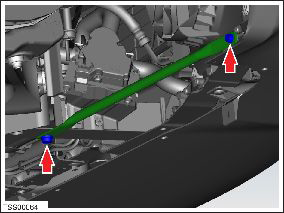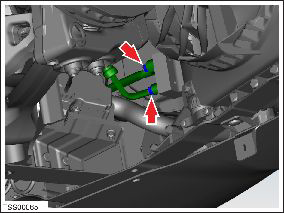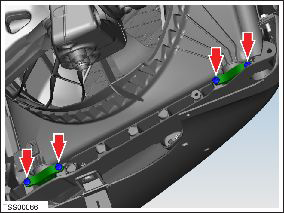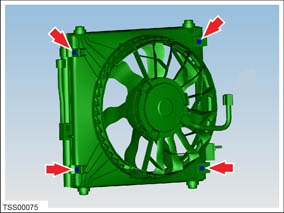Tesla Model S: Condenser - Sub-cool (Remove and Replace)
Tesla Model S (2012-2026) Service Manual / Thermal Management / Condenser - Sub-cool (Remove and Replace)
Removal
- Recover refrigerant from the vehicle (refer to procedure)
- Remove front aero shield panel (refer to procedure)
- Remove front RH wheel arch liner (refer to procedure)
- Remove bolts (x2) securing front bumper panel support bar and
remove (torque 11 Nm).

- Remove nuts (x2) securing two air conditioning pipes (inboard)
to condenser (torque 8 Nm).

- Release pipes and tie aside. Caution: Plug pipe connections to prevent ingress of moisture or dirt. Caution: Remove and discard O-rings.
- Disconnect condenser fan motor connector.
- Remove screws (x4) securing condenser mounting clamps (torque 3
Nm).

- Release condenser from lower mounting and collect clamps.
- Release condenser from upper mounting and remove assembly from vehicle. Caution: Exercise care when removing condenser to avoid damage.
- Remove bolts (x4) securing fan motor assembly to condenser and
separate from fan assembly (torque 6 Nm).

Installation procedure is the reverse of removal.
Note: Clean the affected areas before installation.
Caution: Lubricate new O-rings with clean refrigerant oil.
READ NEXT:
 Fan - Condenser - LH (Remove and Replace)
Fan - Condenser - LH (Remove and Replace)
Removal
Recover refrigerant from the vehicle (refer to procedure).
Remove the front wheel arch liner (refer to procedure).
Remove the bolts (x2) and remove the front bumper support ba
 Fan - Condenser - RH (Remove and Replace)
Fan - Condenser - RH (Remove and Replace)
Removal
Remove the front wheel arch liner (refer to procedure).
If equipped, release the bolts (x2) that secure the front bumper
support bar (torque 11 Nm). Remove the bar from the ve
 Receiver Dryer and Desiccant (Remove and Replace)
Receiver Dryer and Desiccant (Remove and Replace)
Note: The desiccant bag in the receiver dryer is a
serviceable item and must be replaced every 2 years, whenever the
system is opened to ambient air for an extended time, or when an A/C
sy
SEE MORE:
 Refrigerant evacuation and recharging
Refrigerant evacuation and recharging
The HVAC and battery coolant circuits are sealed to prevent the
discharge of refrigerant. The refrigerant must be recovered before any
removal of system components using the recommended equipment.Two
ports are provided on the HVAC system and are accessible under the hood.
Warning: Ens
 Sensor - Parking Distance - Rear - Each (Remove and Replace)
Sensor - Parking Distance - Rear - Each (Remove and Replace)
Removal
Remove the rear fascia assembly (refer to procedure).
Set the fascia assembly on a flat, clean surface.
Disconnect the parking distance sensor connector.
Carefully release the parking dis
© 2019-2026 Copyright www.tesms.org

